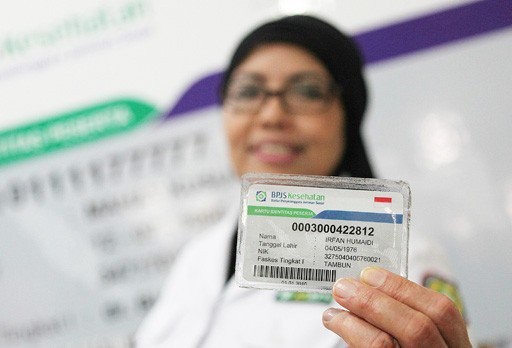Popular Reads
Top Results
Can't find what you're looking for?
View all search resultsPopular Reads
Top Results
Can't find what you're looking for?
View all search resultsFor equal health service access
Two young doctors and their efforts to provide greater access to health services for the less fortunate.
Change text size
Gift Premium Articles
to Anyone
G
etting proper healthcare is a right of every citizen. To fulfill this right entitled to all Indonesians, the government has provided the Health Care and Social Security Agency or better known as BPJS Kesehatan. However, the agency still has many issues and is far from perfect.
BPJS official data show that healthcare insurance participants as of October 2016, totaled 170,213,981, while the number of health service providers only reached 25,862, comprising health centers, doctors and hospitals. The huge disparity forces people to queue up for medical treatment, which can be fatal in cases of emergency, not to mention the unequal distribution of health facilities.
This gap was noticed by two young physicians on duty, Mesty Ariotedjo and Gamal Albinsaid.
Mesty was assigned to a type-C hospital in Flores, East Nusa Tenggara, where she observed patients lining up for therapy while many others weren’t yet on the BPJS list.
“The people there still consider BPJS premiums too high and rather choose to spend their money on daily needs,” said Mesty.
With minimum facilities, they had to be referred to hospitals in Bali to receive more optimal treatment, which was very costly.
Mesty also encountered a bewildered family not knowing what to do as the housewife had just undergone a cesarean section and the newborn turned out to be suffering from hydrocephalus.
In 2005, Gamal Albinsaid, a medical graduate of Brawijaya University, Malang, East Java, while serving as a trainee at the city’s Saiful Anwar Hospital, witnessed a child eventually passing away as his father couldn’t afford to pay medical fees.
(Read also: Gamal Albinsaid: Man on a mission)
“His father was a scavenger and the BPJS program hadn’t yet been fully implemented,” said Gamal.
The tragic stories unfortunately are shared by many others, who were unable to pay healthcare fees even at health centers.
The two tragedies happening at different times and places eventually triggered Gamal and Mesty to do something to promote the quality of public health.
Gamal later set up a Waste Insurance Clinic while Mesty founded a crowd-funding platform called wecare.id.
“Rubbish is easy to obtain,” Gamal pointed out.
By gathering trash or bringing it from their homes to the value of Rp 10,000 (74 US cents) a month, contributors can already enjoy free health services. The waste accumulated is then sorted out. “We recycle organic waste into compost for further sale. Inorganic waste is sold to trash collectors,” added Gamal.
Along with Indonesia Medika, his other agency, Gamal has utilized the funds from waste sales to build clinics in various parts of East Java. He has also invited housewives and health cadres to duplicate the system. “This method solves the problem of waste management and ensures equal access to health services in remote areas,” said the recipient of a United Kingdom award for his efforts.
Meanwhile, Mesty has set up online platform wecare.id that aims to raise funds to help those in need.
“Initially I was assisted by my friend Gigih Septianto, who is knowledgeable about information technology,” revealed Mesty.
First launched in 2015, wecare.id was designed to enable people to offer aid in several roles.
“They can help as donors, medical personnel and catalysts. Donors provide money for the treatment of selected patients, medical personnel find cases requiring medical handling to be notified to the WeCare team, and catalysts report relatives, friends or others needing such medical help,” said the pediatric student.
Despite the improvements being made, especially involving the website, Mesty is optimistic about the movement undertaken by WeCare.
“At present, we’ve managed to help 300 patients suffering various diseases coming from different regions in Indonesia,” she noted. In line with this, the WeCare team keeps growing with its staff now totaling 20 workers and volunteers.
Both Gamal and Mesty hope that their actions will help people have better access to quality health services regardless of their economic situation and geographic location.
“As medical professionals, we can’t remain silent as we watch people facing difficulties in accessing health services and proper treatment,” they stressed.











